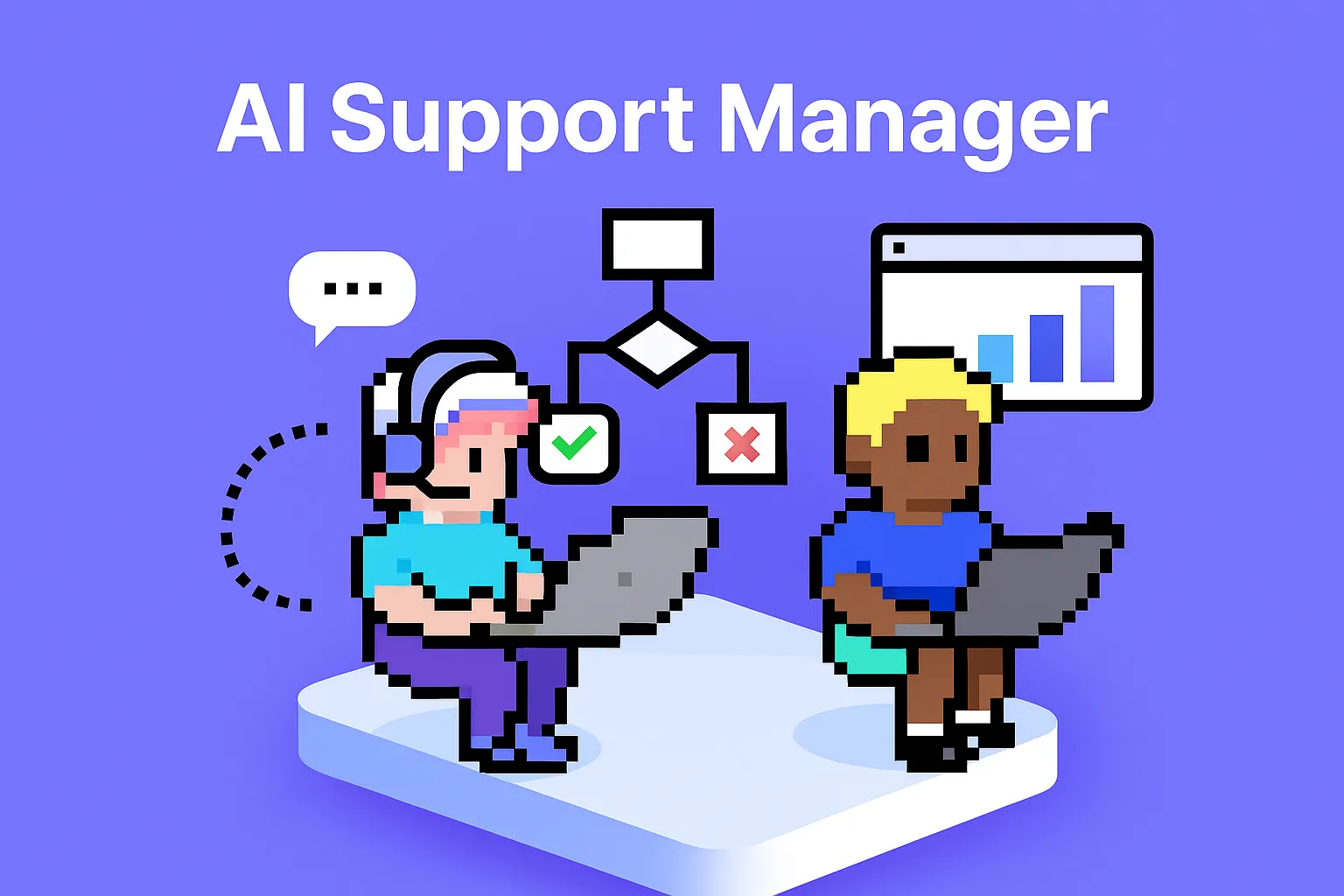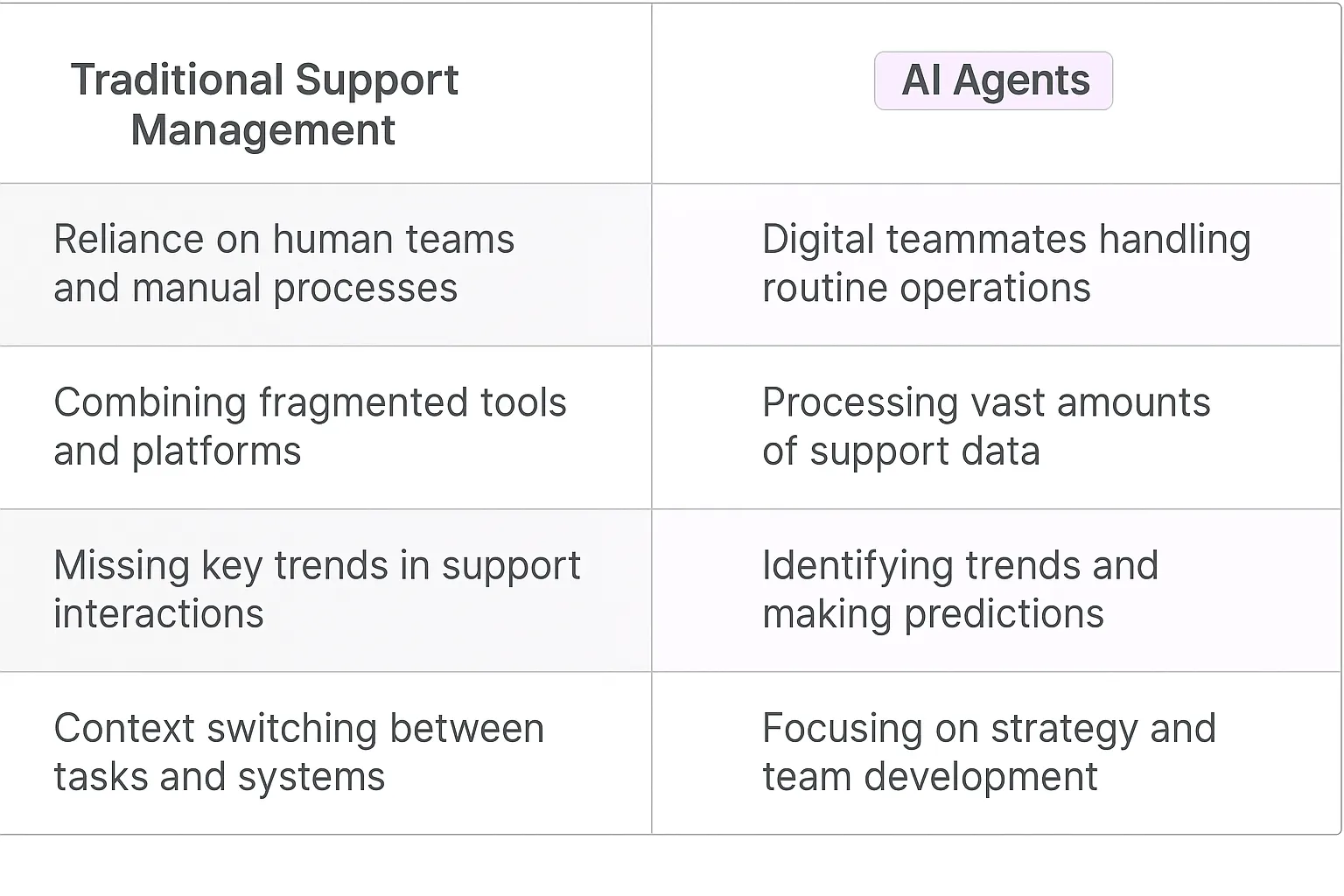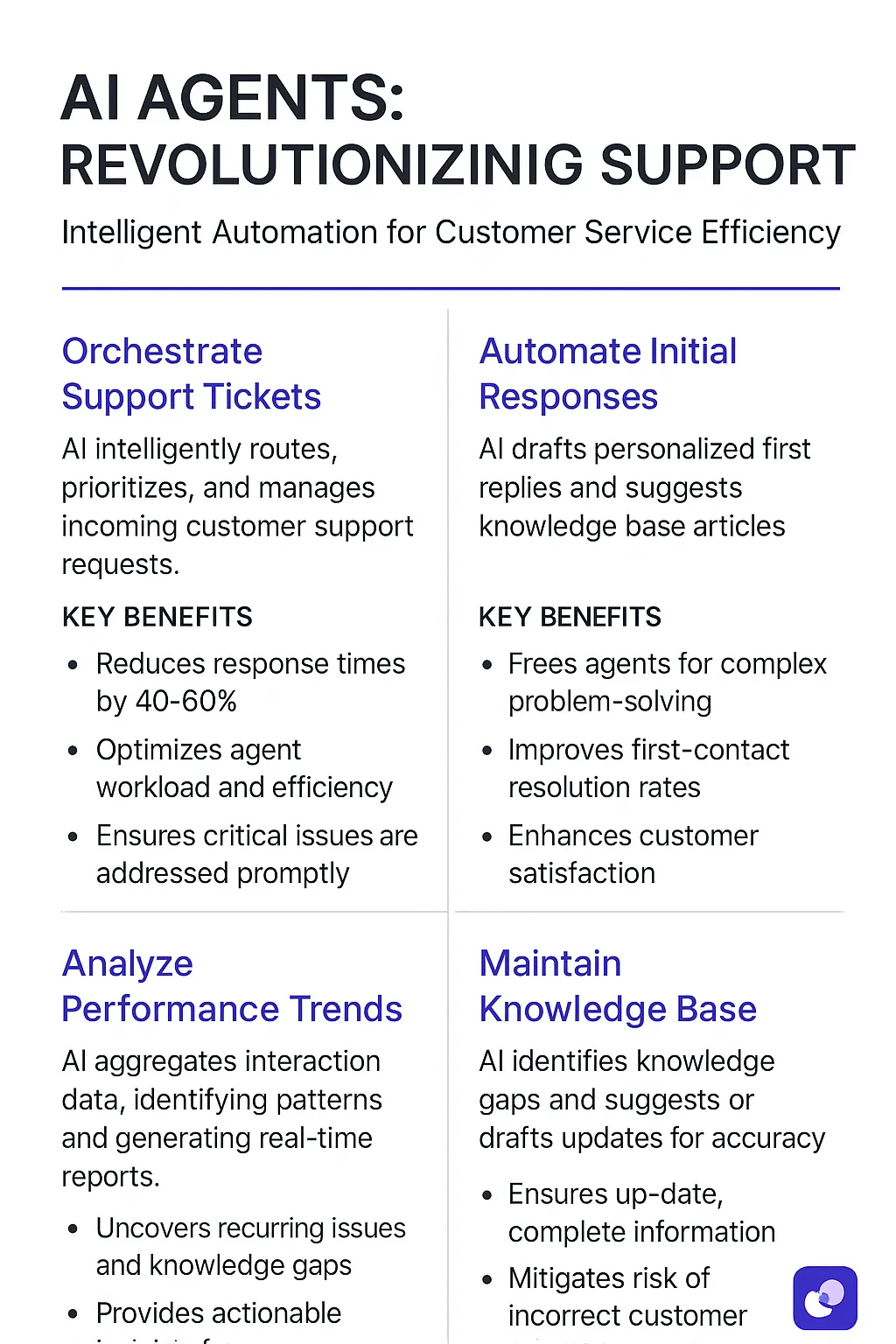AI Support Manager is a sophisticated system that acts as a digital teammate in customer service operations. It processes support interactions, manages ticket routing, and provides real-time insights to human team members. Unlike traditional automation tools, it learns continuously from each interaction, developing deeper understanding of support patterns and customer needs over time.

Traditional support management relied heavily on human teams juggling multiple tools and manual processes. Support managers spent countless hours triaging tickets, routing issues, and maintaining documentation. They used a combination of ticketing systems, knowledge bases, and spreadsheets to track team performance and customer satisfaction. The reality was a fragmented experience where managers constantly context-switched between different platforms while trying to maintain quality standards.
AI Agents fundamentally transform support management by operating as digital teammates that handle the cognitive load of routine operations. They excel at pattern recognition across thousands of support interactions, identifying trends that human managers might miss. For example, they can spot when certain types of issues spike during specific times of day or detect when particular products generate more support requests than usual.
The most compelling aspect is how AI Agents augment human decision-making. They process vast amounts of support data to suggest optimal ticket routing, predict customer satisfaction risks, and automatically update knowledge bases. This creates a multiplier effect - support managers can focus on strategic initiatives and team development while AI handles the operational heavy lifting.
From a metrics perspective, AI Agents drive significant improvements:
The network effects are particularly interesting - as AI Agents process more support interactions, they become increasingly effective at predicting issues and suggesting solutions. This creates a virtuous cycle where support quality continuously improves while manager workload decreases.
Looking at the growth curves of companies using AI Agents for support management, we consistently see exponential improvements in team efficiency and customer satisfaction metrics. The technology essentially gives support managers superpowers - enabling them to operate at a scale and level of insight that wasn't possible before.

Support teams face complex challenges managing high-volume customer interactions while maintaining quality and response times. AI Support Manager agents transform how teams handle these demands by operating as intelligent coordinators between support staff and customers.
The most successful support teams I've worked with leverage AI Support Managers to handle the cognitive overhead of queue management. One mid-size SaaS company reduced their average response time by 47% by implementing intelligent ticket routing and automated initial responses.
What's particularly fascinating is how these digital teammates enhance human support agents rather than replace them. They act as a force multiplier - handling the organizational complexity while letting human agents focus on building customer relationships and solving complex problems.
The network effects are remarkable: as more tickets flow through the system, the AI becomes increasingly adept at matching issues to solutions and predicting which tickets need immediate attention. This creates a powerful feedback loop that continuously improves support quality while reducing agent burnout.
Start small by implementing basic ticket routing and template generation. Once the team adapts to working with the AI Support Manager, gradually expand its responsibilities. The key is to view it as a learning system that grows more valuable as it processes more support interactions.
The most effective implementations maintain human oversight while allowing the AI to handle increasing complexity. This creates a scalable support operation that can maintain high-quality customer service even during rapid growth phases.

The AI Support Manager landscape is undergoing a fascinating transformation that's reshaping how companies handle customer interactions and internal support processes. Support teams across industries are discovering that AI agents serve as digital teammates who can handle complex support workflows while maintaining a human-centric approach.
What's particularly compelling is how these AI agents adapt to different industry contexts. They're not just generic support tools - they're becoming specialized partners that understand industry-specific terminology, compliance requirements, and customer expectations. From healthcare providers managing patient inquiries to fintech companies handling sensitive transaction disputes, AI Support Managers are proving their versatility in ways that go far beyond basic ticket routing.
The most interesting pattern I've observed is how AI Support Managers are shifting from being purely reactive tools to proactive partners in the support ecosystem. They're identifying potential issues before they escalate, suggesting process improvements based on interaction patterns, and helping human support teams focus on high-impact activities where their expertise matters most.
Let's explore how different industries are leveraging AI Support Managers to create more responsive, efficient, and empathetic support experiences for both customer interactions and internal teams.
When I advise e-commerce startups, one pattern emerges consistently - support teams get overwhelmed during growth phases, leading to response delays and frustrated customers. An AI Support Manager transforms this dynamic by operating as a digital teammate that never sleeps.
Take an online fashion retailer handling 10,000+ customer interactions monthly. The AI Support Manager analyzes incoming tickets, identifying urgent issues like payment failures or shipping delays. It automatically routes these high-priority cases to specialized human agents while handling routine queries about sizing and returns independently.
What's fascinating is how the AI learns from every interaction. It picks up on seasonal patterns (like increased size-related questions during holiday sales) and adapts its responses accordingly. The system also spots emerging issues - if multiple customers report similar problems with a new product line, it flags this trend for the product team before it becomes a crisis.
The real magic happens in the metrics: Companies implementing AI Support Managers typically see a 60% reduction in first-response time and can handle 3x more tickets without adding headcount. But the most valuable outcome isn't just efficiency - it's the ability to transform support from a cost center into a strategic asset. The AI's pattern recognition capabilities provide invaluable product feedback and customer behavior insights that inform business strategy.
For e-commerce businesses scaling beyond $10M in revenue, this shift from reactive to proactive customer service management becomes a critical competitive advantage. The AI Support Manager doesn't just solve tickets - it helps predict and prevent them.
The transformation extends beyond operational efficiency to strategic support management. Teams can now focus on building customer relationships and improving products rather than just managing ticket queues.
While advising healthcare startups, I've noticed a critical bottleneck in patient support coordination that's ripe for AI transformation. Multi-specialty clinics handling thousands of patient inquiries face a complex challenge: maintaining personalized care while managing high volumes of communication.
A regional healthcare network I worked with implemented an AI Support Manager to tackle their 25,000 monthly patient interactions. The AI analyzes incoming messages, distinguishing between urgent medical concerns requiring immediate physician attention and routine administrative requests like appointment scheduling or prescription refills.
The sophistication of the system lies in its contextual understanding. It considers patient history, upcoming appointments, and recent lab results when prioritizing inquiries. For instance, when a diabetic patient reports unusual symptoms, the AI correlates this with their latest glucose readings and medication schedule, escalating critical cases to the appropriate specialist.
What's particularly compelling is the AI's role in preventive care. By analyzing communication patterns, it identifies patients at risk of missing follow-ups or showing early signs of complications. One clinic reported a 40% reduction in missed appointments and a 70% improvement in chronic disease monitoring adherence after implementation.
The numbers tell an interesting story: Healthcare providers using AI Support Managers see an 80% reduction in administrative burden on medical staff and a 45% increase in patient satisfaction scores. But the real breakthrough is in care quality - the system's ability to spot subtle patterns in patient support communications often leads to earlier interventions and better health outcomes.
For healthcare organizations serving 50,000+ patients annually, this shift from reactive to proactive patient support becomes a fundamental driver of both operational efficiency and clinical excellence. The AI Support Manager evolves from a simple triage tool into a crucial component of the care delivery system.
Building an AI Support Manager requires careful navigation of several technical complexities. The agent needs seamless access to your knowledge base, ticket history, and customer interaction data - which often exist in different formats across various systems. Many organizations struggle with data silos and inconsistent API implementations that can limit the agent's effectiveness.
Natural language processing capabilities must be finely tuned to understand support context, technical jargon, and customer sentiment. Without proper training on domain-specific language, the agent may misinterpret requests or provide incorrect solutions.
Support teams often face resistance when introducing AI managers into their workflow. Human agents may worry about job security or feel uncomfortable being "managed" by an AI system. Creating clear roles and responsibilities while emphasizing how the AI enhances rather than replaces human work becomes crucial.
Setting realistic expectations around the AI's capabilities is essential. While it can handle routine tasks like ticket routing and basic troubleshooting, complex scenarios still require human judgment. Finding this balance takes time and iteration.
Support conversations often contain sensitive customer information. The AI manager must maintain strict data handling protocols while still having enough access to be useful. Organizations need robust systems for data masking, access controls, and audit trails.
Traditional support metrics may not fully capture the AI manager's impact. New frameworks are needed to evaluate both quantitative improvements (response times, resolution rates) and qualitative factors (team satisfaction, knowledge sharing effectiveness). Establishing these metrics early helps justify the investment and guide optimization efforts.
As support volume grows, the AI manager must scale effectively without degrading performance. This includes handling increased data processing loads, maintaining response times, and adapting to new support channels or product lines. The infrastructure needs careful planning to avoid bottlenecks during peak periods.
The adoption of AI Support Manager agents marks a fundamental shift in how organizations approach customer service operations. The data shows consistent improvements across key metrics - from 40-60% faster response times to exponential gains in team efficiency. What's most compelling is the compound effect: as these systems process more interactions, their effectiveness grows exponentially, creating a sustainable competitive advantage for early adopters.
Looking ahead, organizations that successfully integrate AI Support Managers will likely see continued improvements in both operational efficiency and customer satisfaction. The key to success lies in viewing these digital teammates not as replacements for human agents, but as powerful tools that enhance human capabilities and enable support teams to operate at previously impossible scales.